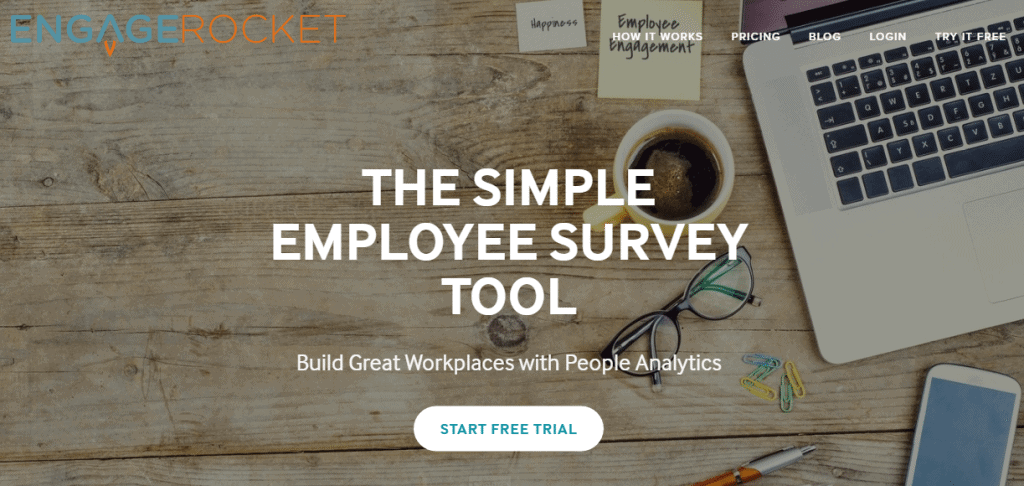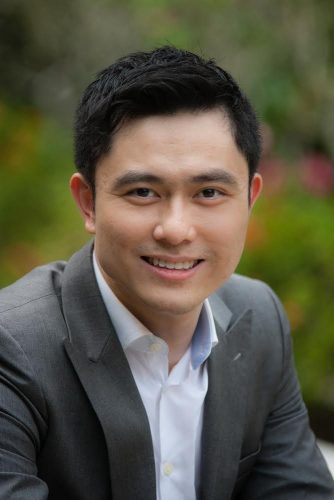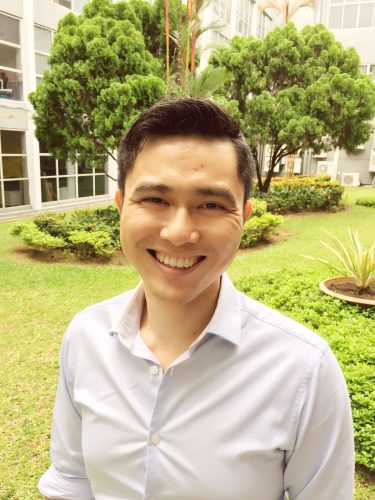I first met CheeTung at HR Analytics Singapore meet up group.
Being a HR Tech fanatic, I was intrigued by the company he co-founded which focus on building a great workplace.
And soon after I’m reading about him every where in outlets such as Channel Newsasia,The Business Times,The Straits Times, The Jakarta Post, Kompas, Asian Banking and Finance, The Asian Banker, The Gallup Business Journal, and others.
With almost 15 years of experience working in management positions, he was a recipient of the prestigious Singapore Armed Forces Overseas Scholarship (SAFOS).
What drove a former scholar and Director of Gallup Southeast Asia to step into the unknown realms of entrepreneurship?
Let’s find out:
1. Please share a bit about what you do.
Currently, my co-founder and I are working on a startup called EngageRocket.
It is a software that analyses employee feedback in real-time to advise you on how to manage your team better.
Using a combination of pulse surveys, machine learning algorithms and natural language processing, EngageRocket helps companies build a better culture one team at a time.
Effectively, we work to remove all the administrative and analytical load of conducting employee surveys, allowing leaders and managers to focus on what’s actually important – managing their teams better.
This, combined with advanced survey UX design, allows teams to get feedback and targeted recommendations far quicker than traditional annual employee surveys.
With our algorithms in place, the longer you’re on the platform the more relevant its recommendations are for you as a leader.
2. When you were a kid what did you want to be when you grew up?
I always wanted to be a scientist – complete with lab coat, test tubes, the works. It was kinda geeky, but it was between that and a Sherlock-esque detective.
3. What were you doing before starting this business?
I was the South-east Asia director for Gallup. They are a global research and consulting company based in the US.
4. How did the idea for your business come about?
My co-founder and I both worked in the regional leadership of my previous company.
We found that while we continued to be able to serve the Fortune 500 segment’s needs around HR analytics and employee engagement surveys, our processes were a bit outdated and could have been replaced with advanced automation.
As we worked on a boutique consulting business initially around helping companies with HR analytics, we found that an automated software-as-a-service solution helped to solve many of our clients’ problems around managing a 3rd-party upward feedback mechanism, as well as effectively eliminate the administrative and analytical load on us as consultants.
Thus, EngageRocket was born.
5. What sacrifices have you had to make to be a successful entrepreneur?
One of the hardest things to get used to for me was not receiving a salary.
This meant all my previous personal financial planning assumptions had to change massively.
No longer was I thinking about how to diversify asset classes in savings.
My main focus in my personal financial life (as it is in running EngageRocket) suddenly became burn rate and runway.
While I did make provisions before taking the leap, it’s a completely different psychology once you’re in it.
The mind-space that business takes and the continual stress it creates has resulted in me losing hair, putting on weight, and many missed social engagements.
6. How did you get funded?
We started out completely bootstrapping.
With a small investment, we were selling any kind of consulting project we could close.
When the decision came to pivot to a SaaS business model, consulting revenues were an important means of covering development costs, which we had to incur since neither of us are technical.
7. How do you go about marketing your business?
Buyers of our software are most clearly defined as a psychographic group – besides HR conferences, the decision-makers tend to be business leaders with a keen interest in improving team / company culture, making evidence-based decisions, and know their way around technology.
So a content outreach strategy is our best bet in earning credibility and calling these forward-thinking individuals together.
We publish high quality content regularly at http://blog.engagerocket.co, as well as in other media outlets and guest posts.
This is reinforced by building and supporting communities of like-minded individuals online and offline through events and dedicated interest groups.
8. Could you describe your first sale and how it came about?
Our first sale started from an interview I did when applying for a role with one of the government-sponsored programmes for an unrelated consulting gig.
One of the interviewers thought my expertise would be helpful to one of her clients, and we were introduced.
As this client and I held similar views on leadership, management, technology and data, we built a friendship and when we had put together our MVP, he was one of the first to call us to try it out in his company.
We’re so honoured that he continues to be a customer till today, and he remains one of our most valued relationships.
9. Describe/outline your typical work day?
Actually one of the things I appreciate about being an entrepreneur is that it’s very hard to find two work days that look alike!
Let’s take one recent day as an example.
I started the day getting into office at about 9.15am, had a short chat with a friend sharing our office space before diving into replying emails and preparing for the day’s meetings and presentations.
After a couple of rehearsals, we hop on an Uber to pitch the senior partners of a VC, along the way running through all the relevant metrics in my mind: business plan, financial and operational metrics, go-to-market strategy, etc.
Felt almost like preparing for an exam: spotting questions, concerns, preparing solid answers.
Pitch goes relatively smoothly, thankfully our preparations paid off and we gave a strong account of ourselves.
Next we’re head-first into a lunch meeting with some influential folks to introduce the HR analytics space and EngageRocket in a presentation.
I’ve never been much of a networker, but focusing on how to bring value to each person I meet helps.
We’re in town, which makes a good opportunity to visit our first customer to say hi and pass over some materials.
The courtesy call goes well – given its impromptu nature – and we’re back into office to follow up on the new inroads we’ve made.
10. What has been your proudest moment in the history of your business and why?
It’s hard to say as it’s still early days.
Launch day probably comes closest to being my proudest moment, as we pulled so much together to make something from virtually nothing.
11. What was the lowest point for you in this business?
No question it was the need to exit one of our early co-founders.
It was an extremely painful decision, and it posed an existential risk to the entire team which could very easily have dissolved after that episode.
At the end of the day, we were too small a team to deal with repeated issues with the integrity of that co-founder, as well as the constant sense that he was not pulling his weight.
He came in with very strong credentials: pedigreed education and big-name consultant background, and a generous exit from a previous company that he had set up.
What I didn’t expect was a poor work-rate requiring constant supervision, several occasions of blatant plagiarism that we caught, and the withholding of mission critical information from the rest of the team.
Ultimately, we had to bite the bullet and negotiate a buy-out, which seemed ridiculous at that time that to punish terrible behaviour we had to pay thousands out of pocket to buy his shares.
Biggest thing I learnt from the experience was how track-record is barely scratching the surface when considering someone as a co-founder.
I’ve worked with my other co-founder for more than 5 years now, and we have a high degree of trust and understanding of how each other works.
The guy we had to exit I only met for a month before agreeing for him to be on board, and in hindsight there was a whole lot more due diligence I could have done with him, as well as structuring his inclusion in a more gradual manner.
An expensive lesson, but one which I hope other entrepreneurs can learn from without going through the pain themselves.
12. What’s your revenue numbers over the past year?
We’re in 6-figures, but it has been mostly driven by consulting revenue prior to our pivot to software.
If things go according to plan, we’d completely replace that revenue by 2Q2017, which we’re working hard to achieve.
13. Who has influenced you most when it comes to how you approach your work?
There are many influences I’m subject to, maybe because I’m obsessive about learning.
The one source that I keep going back to is Ben Horowitz’s “The Hard Thing About Hard Things”, which contains many practical gems of advice that makes the book feel like a startup CEO’s handbook and Chicken Soup for the Soul all combined into one.
The other influence on my approach to learning and excellence in any given discipline (as a startup founder there are like 6 different areas to master before breakfast every day!) is Tim Ferriss and his books and podcasts.
“The Four Hour Workweek” surprised me with its practical approach to time management and productivity despite its hype-y name, and continues to influence the lean approach to growth that we take at EngageRocket.
14. If you could go back in time to speak to your 20-year-old self, what would you tell him?
Get extremely curious about the world: success comes in many forms, and it’s worth your time to study why and how people achieve it.
15. What’s the worst piece of advice you ever got?
Build it and they will come. So wrong.
16. What’s your business focus for this year?
Conclusively achieve Product-Market Fit and have a best-in-class product to serve a very well-defined customer segment.
17. What’s a productivity tip you swear by?
It’s a combination of the Pareto principle (otherwise known as the 80-20 principle) and Parkinson’s Law.
In essence:
- in most endeavours finding the right 20% to focus efforts can yield 80% of the result; and
- set challenging time limits for activities as effort and perceived importance of a task expands to fill the time allocated for it.
18. Is there an app or tool you can’t live without?
So many! I’m an app / productivity junkie. If I had to choose, I’d probably choose good old Evernote, as it has successfully taken over so many memory functions.
Keen to learn more about Chee Tung?
LinkedIN: http://bit.ly/linkcheetung.







